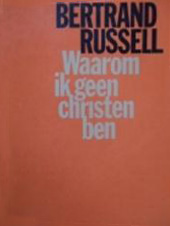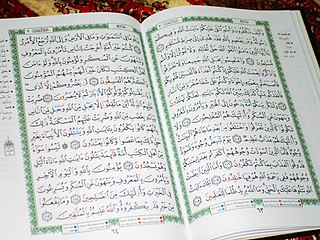
Ibn Warraq is the pen name of an anonymous author critical of Islam. He is the founder of the Institute for the Secularisation of Islamic Society and used to be a senior research fellow at the Center for Inquiry, focusing on Quranic criticism. Warraq is the Vice-President of the World Encounter Institute.

Why I Am Not a Christian is an essay by the British philosopher Bertrand Russell. Originally a talk given 6 March 1927 at Battersea Town Hall, under the auspices of the South London Branch of the National Secular Society, it was published that year as a pamphlet and has been republished several times in English and in translation.

Leaving Islam: Apostates Speak Out is a 2003 book, authored and edited by ex-Muslim and secularist Ibn Warraq, that researches and documents cases of apostasy in Islam. It also contains a collection of essays by ex-Muslims recounting their own experience in leaving the Islamic religion.
Prometheus Books is a publishing company founded in August 1969 by the philosopher Paul Kurtz. The publisher's name was derived from Prometheus, the Titan from Greek mythology who stole fire from Zeus and gave it to man. This act is often used as a metaphor for bringing knowledge or enlightenment.
Abu al-Hasan Ahmad ibn Yahya ibn Ishaq al-Rawandi, commonly known as Ibn al-Rawandi, was an early Persian scholar and theologian. In his early days, he was a Mu'tazilite scholar, but then rejected the Mu'tazilite doctrine. Afterwards, he became a Shia scholar; there is some debate about whether he stayed a Shia until his death or became a skeptic, though most sources confirm his eventual rejection of all religion and becoming an atheist. Although none of his works have survived, his opinions had been preserved through his critics and the surviving books that answered him. His book with the most preserved fragments is the Kitab al-Zumurrud.
Criticism of Islam is broadly defined as criticism of the Islamic religion in its beliefs, principles, and/or any other ideas attributed to Islam.
Christoph Luxenberg is the pseudonym of the author of The Syro-Aramaic Reading of the Koran: A Contribution to the Decoding of the Language of the Qur'an and several articles in anthologies about early Islam.

The Origins of The Koran: Classic Essays on Islam’s Holy Book, is a 1998 book edited by Ibn Warraq. It contains a collection of 13 critical studies of the Qur'an written over the past two centuries by historians and scholars of the Middle East: Ibn Warraq, Theodor Nöldeke, Leone Caetani, Alphonse Mingana, Arthur Jeffery, David Samuel Margoliouth, Abraham Geiger, William St. Clair Tisdall, Charles Cutler Torrey and Andrew Rippin. Most of these authors wrote their essays on the Qur'an before World War II (1939–1945).
William St. Clair Tisdall (1859–1928) was a British Anglican priest, linguist, historian and philologist who served as the Secretary of the Church of England's Missionary Society in Isfahan, Persia.
Yehuda D. Nevo b. 1932 was a Middle Eastern archeologist living in Israel. He died after a long battle with cancer in 1992.
Herbert Berg is a scholar of religion. Trained at the University of Toronto's Centre for the Study of Religion in the late 1980s and early 1990s, he is currently a Visiting Assistant Professor of Religious Studies at Rhodes College. He previously taught as a Professor in the Department of International Studies and the Department of Philosophy and Religion at the University of North Carolina Wilmington and was the Director of the International Studies from 2011 to 2018. At UNCW, he has been recognized with the University of North Carolina Board of Governor’s Award for Excellence in Teaching (2019), the Governor’s Award for Excellence for "Outstanding State Government Service" (2013), the Distinguished Faculty Scholar Award (2013), the Board of Trustees Teaching Excellence Award (2012), the Distinguished Teaching Professorship Award (2012), and the Chancellor’s Teaching Excellence Award (2006).

The Legacy of Jihad: Islamic Holy War and the Fate of Non-Muslims is a book by Andrew Bostom, a medical doctor who has written several other works discussing Islamic intolerance. The foreword was written by author and ex-Muslim, Ibn Warraq. The book is framed as a rejection of the notion that Islam is a peaceful religion and sets out to prove that Islam is violent and intolerant.

Criticism of the Quran is an interdisciplinary field of study concerning the factual accuracy of the claims and the moral tenability of the commands made in the Quran, the holy book of Islam. The Quran is viewed to be the scriptural foundation of Islam and is believed by Muslims to have been sent down by God (Allah) and revealed to Muhammad by the angel Jabreel (Gabriel). It has been subject to criticism both in the sense of being studied by mostly secular Western scholars.

The historicity of Muhammad refers to the study of Muhammad as a historical figure and critical examination of sources upon which traditional accounts are based.

The Satanic Verses controversy, also known as the Rushdie Affair, was the heated reaction of some Muslims to the publication of Salman Rushdie's novel The Satanic Verses, in the United Kingdom in 1988, which was inspired in part by the life of Muhammad. Many Muslims accused Rushdie of blasphemy or unbelief and in 1989 the Ayatollah Ruhollah Khomeini of Iran issued a fatwa ordering Muslims to kill Rushdie. Numerous killings, attempted killings, and bombings resulted in response to the novel.
This is a bibliography of literature treating the topic of criticism of Islam, sorted by source publication and the author's last name.
The Revisionist school of Islamic studies, is a movement in Islamic studies that questions traditional Muslim narratives of Islam's origins.

Historical reliability of the Quran concerns the question of the historicity of the described or claimed events in the Quran.
Ex-Muslims are people who were raised as Muslims or converted to Islam and later renounced the religion. Leaving Islam is a uniquely individual experience and a growing social phenomenon facing its challenges due to the conditions of Islam, Islamic culture, and - depending upon the context - the local culture, which leads to ex-Muslims' increasingly organized literary and social activism. Ex-Muslims also organize groups to build mutual support networks to meet life's challenges after abandoning religious practices.









